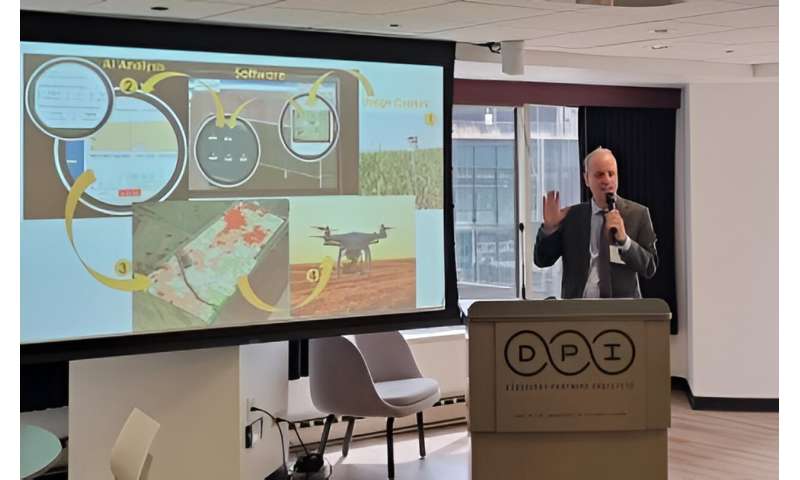Registration of biological pest control products exceeds that of agrochemicals in Brazil

The number of biological products registered in Brazil in recent years for crop protection against agricultural pests has surpassed that of agrochemicals. Around 90% of the area under sugarcane cultivation in the country, for example, already uses natural enemies such as microorganisms, macroorganisms, biochemicals (compounds of natural origin that control pests and diseases) and semiochemicals (molecules that induce behavioral responses in target organisms).
The data were presented by José Maurício Simões Bento, a professor at the Luiz de Queiroz College of Agriculture at the University of São Paulo (ESALQ-USP), in a panel discussion on intelligent agriculture during FAPESP Week Illinois, on April 10, in Chicago (United States).
"There are currently around 629 biological products registered in Brazil for pest control, involving microorganisms, macroorganisms, biochemicals and semiochemicals. This number has been steadily increasing year after year," said Bento, who is one of the main researchers at the São Paulo Advanced Research Center for Biological Control (SPARCBio), an Engineering Research Center (ERC) set up by FAPESP in partnership with the company Koppert.
According to the researcher, approximately 20% of the world's agricultural producers use biological products. Brazil leads the way with 55% of farms using biocontrol, compared to 6% in the United States. For biostimulants, the country's share is 50% versus 16%, and for biofertilizers, it is 36% versus 12% for the two countries, respectively.
"Today, Brazil has around 170 biofactories, treating an area of approximately 25 million hectares, and a market that moves more than US$ 1 billion a year, with a growth projection of 15% to 20% a year," Bento reported.
In plantations of sugarcane – of which Brazil is the world's largest producer, with 22 million hectares planted and a fourfold increase in production over the past 40 years – biological control has been combined with technologies such as monitoring systems, sensors, artificial intelligence and autonomous vehicles to improve its application.
Smart traps, equipped with cameras that capture images of captured insects attracted by pheromones, have been installed throughout the planted areas.
The images are sent to a central processing unit, where they are processed by software that quantifies the insects captured. Using artificial intelligence tools, the images are processed together with climate data and weather forecasts.
"This artificial intelligence processing allows us to estimate the insect population for the next few days and accurately determine the most appropriate date to release natural enemies in different parts of the farm, which is done using drones," Bento explained.
Impact of climate change
Artificial intelligence tools have also made it possible to model the impacts of climate change, such as drought, high temperatures and increased levels of carbon dioxide (CO2), on the composition of soybeans produced in Brazil.
By analyzing them, a group of researchers from USP's Institute of Biosciences observed that, up to a point, high levels of CO2 have a protective effect on soybeans, which begin to produce more seeds, for example. At high temperatures, the results are even better. However, when these two variables are mixed with drought, the effect on the plant can be disastrous, altering the composition of the grain's oils.
"This could have disastrous economic impacts for Brazil, which is the world's largest oilseed producer, followed by the United States," said Marcos Buckeridge, professor at IB-USP and coordinator of the study.
According to the researcher, the soybean varieties produced in Brazil and the United States are completely different genetically. "That's why it's important to collaborate on research to advance our understanding of the possible impacts of climate change on these plants," he stressed.
Use of robots
In the United States, researchers at the University of Illinois in Urbana-Champaign are conducting a program on the use of artificial intelligence to develop sustainable agricultural solutions.
One of the technologies being developed is small robots, with wheels and other devices, designed to control weeds in cornfields, for example.
"These robots can pass under the plant canopy, detect weeds and remove them mechanically. The way this is done today is very primitive. Conventional herbicides can only be applied before the canopy closes, in the early stages of the growing season," explained Madhu Khana, a professor at the institution and coordinator of the project.
Another application for robots is planting cover crops, which are intended to temporarily cover the soil after harvest to protect it from erosion and nutrient loss.
"These robots can spread the cover crop seeds. That way, when the corn is harvested, the cover crop is already planted. Using them also helps reduce the need for labor, improve soil health, reduce the need for fertilizers and the amount of weeds," Khana said.
According to the researcher, cover crop adoption rates have increased over time, but are still less than 10% of hectares in the Midwestern United States.
The researchers have conducted studies using machine learning and remote sensing tools to analyze changes in cover crop adoption over time in three US states: Illinois, Iowa and Indiana.
The results of the studies showed that the likelihood of adopting this practice increases when it is already used by neighboring farms, when soil quality is poor, and when the cost of cover crops is lower, among other factors.
More information about FAPESP Week Illinois can be found at: fapesp.br/week/2024/illinois.
Provided by FAPESP